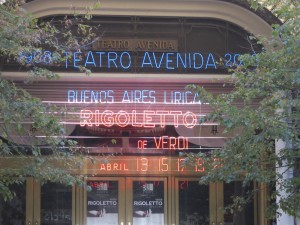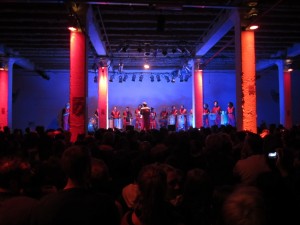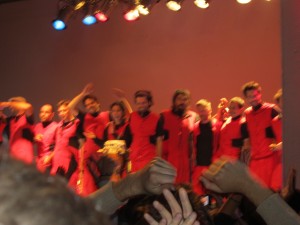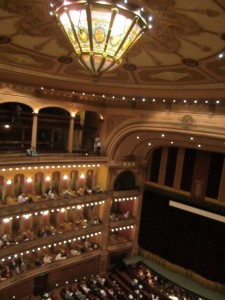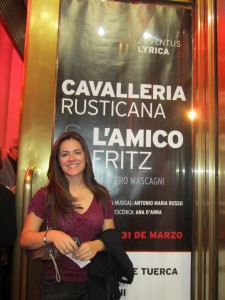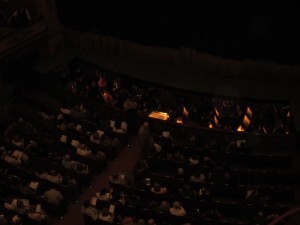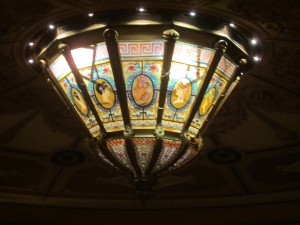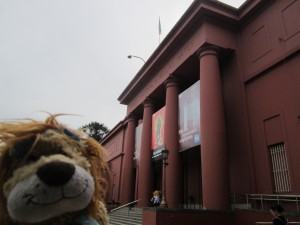As you know Lewis the Lion loves learning new things and appreciating the finer things in life, especially music, art, drama and dance. Well, in Buenos Aires he had come just to the right place (as we have already discovered with the tango dancing!). As the capital city of Argentina, Buenos Aires had lots of culturally rich experiences on offer from theatres to museums, from music festivals to shows: this place seemed to have it all!
Music
The first week that Lewis arrived in Buenos Aires he was told at the last minute about a special show that only occurred once a week: it was a special drumming ensemble and the event was called “La Bomba de Tiempo.” Some of the samba beats and improvisation reminded Lewis the Lion of some of the drumming he had seen on the streets of Lapa, in Rio de Janeiro. However, this particular group was more impressive still as they played non-stop for nearly two hours. He just couldn’t help but move his body and tap his feet in time with the music! Click here to get a taster of what Lewis the Lion listened to.
Music and Drama
Lewis the Lion knows what a lucky lion he is and it so happened that on the road he was living, Avenida de Mayo, there was a very grand and impressive theatre – el teatro Avenida.
Outside they were advertising some very famous operas which would take place on three nights only: L’Amico Fritz and Cavalleria Rusticana. These operas would be sung in Italian so Lewis the Lion was happy about that because he loves speaking the Italian language however, he didn’t think he’d be able to go because everybody knows that normally going to the opera is very expensive. He didn’t think he had a chance but nonetheless, ventured to the ticket office just to check the ticket prices. Well, he just couldn’t believe his luck! If he was prepared to go right to the very top of the theatre and take a seat in the gods (or “en paraiso” as the Spanish call it – “in heaven” which he rather liked!), then the tickets were only 50 Argentine Pesos each (approximately £7)! Helen agreed with him that they just couldn’t miss this golden opportunity. So, together with their friend, Stephanie, they went to see these two operas for the price of one!
The first opera, L’Amico Fritz was quite comedic whilst the second opera, La Cavalleria Rusticana, was a tragedy. From where Lewis the Lion was sitting in this grand theatre he could see all the instruments in the orchestra pit being played.
Nothing beats listening to live music and especially when you can work out what instrument is being played at any one time! In the opera, La Cavelleria Rusticana, there is a very famous piece of music in the middle – the intermezzo – and it was so beautiful that it nearly moved Lewis the Lion to tears and gave him goosebumps! Click here to hear a little bit of the music which is from a video clip on You Tube. (Unfortunately Lewis the Lion couldn’t take any videos himself during the performances).
Lewis the Lion also loved the fact that whilst he watched the actors singing in Italian, along the top of the stage were subtitles in Spanish for the Spanish speaking audience. This also helped him to practise his Spanish too! However, even if you didn’t understand a word in either language, because the opera is so visual with the sets and the acting, you could still understand the story as it was being told.
As if these two operas weren’t enough, Lewis the Lion also went to see yet another opera at the same theatre during his stay in Buenos Aires. This was because one of Helen’s favourite operas by the composer, Giuseppe Verdi, was being performed: Rigoletto. The soprano and the bass singers were particularly brilliant during this performance. You can listen to one of the most famous songs in this opera by clicking on this link. In this video clip from You Tube, the song is sung by the famous Italian tenor, Andrea Bocelli, and is called “La donna è mobile.” Roughly translated this means that “Women are fickle!”
Art
Lewis the Lion was also spoilt for choice when it came to seeing art in Buenos Aires. Like in the theatre, he couldn’t really take pictures inside the galleries but he did visit two of the most prominent art galleries in Buenos Aires:
Museo Nacional de Bellas Artes (The National Fine Arts Museum) and
Malba – el Museo de Arte Latinoamericano de Buenos Aires (The Buenos Aires Latin American Art Museum). You can click on the links to the museums’ websites in English where you can find out more information.
The first museum, el Museo Nacional de Bellas Artes, had more classical art whereas the second museum, had more examples of modern art. In both museums, Lewis admired the technical skills of the artists but also the concepts they were trying to transmit to the viewers.
In particular, Lewis the Lion was excited to see some of the European art that he was familiar with in Las Bellas Artes museum. Some such sketches that he was happy to see were by the French impressionist artist, Edgar Degas. One of these sketches was of ballet dancer training at the bar – click here to see it. He was also happy to be introduced to Latin American artists for a change because he didn’t know much about Latin American art. He especially liked a 19th Century Argentine artist called Candido Lopez who painted great battlefield scenes. Click here to see some.
Do you have a particular favourite type of music? What is it and why?
Do you have a favourite artist? Who is it and why?

